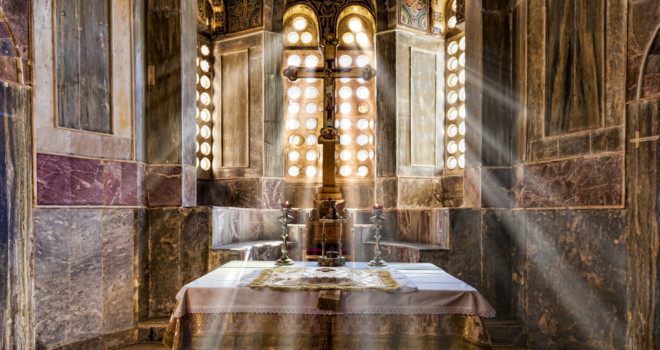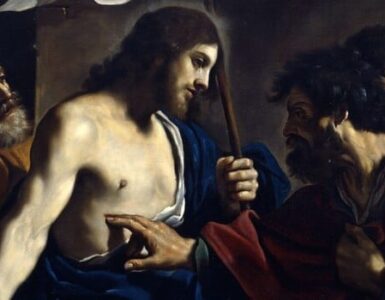Many of us who have recently been married, or have children that were recently married, are very familiar with the angst and anxiety surrounding the wedding feast, or as we call it today, the wedding reception. Most of us are careful about who we invite. We invite the most important people in our lives, the people who will most likely respond “yes” to our invitation.
We may invite many, but we hope that more than only a few will respond. We hope also that our beloved guests will wear their Sunday best, their finest clothing, without stains or wrinkles.
Jesus often explains the Kingdom of God with metaphors. The Kingdom of God is something so rich, beautiful and profound that “no eye has seen, nor ear heard, nor human heart imagined” the fullness of reality. As physical lowly creatures of God, we are limited by our eyes and ears and the imagination of our hearts.
So, Jesus gives us a metaphor: the Wedding Feast of the King’s Son*. The wedding feast may represent any number of spiritual and mystical realities:
- 1) the union of Jesus Christ, the Bridegroom, with the Church, His spouse, or
- 2) the communion of our soul with the Lord in prayer or in reading the Bible, or
- 3) the Presence of the Resurrected Christ in the Church and Her sacred Mysteries, the Sacraments or,
- 4) the Presence of Jesus among the saints in heaven in the age to come.
Nonetheless, in this wedding feast, many are called, but few are chosen. Who are the many and who are the few?
The Lord begins his parable: the king has prepared a wedding feast. He has slaughtered the oxen and the fattened calves, the time has come. Now is the time to celebrate the wedding feast of the king’s son. The intended guests, I assume, are men and women that the king expects will attend. But, they fail to respond to the king’s servants when they are called to the wedding. In the hymns of the Byzantine liturgy a few days before Easter Sunday, the choir sings “Behold the Bridegroom is coming in the middle of the night, blessed is the servant He shall find awake, but the one He shall find neglectful will not be worthy of Him.” The first intended guests refuse to come. They are neglectful. They are not paying attention to the message of the king’s servants, a calling to feast, to communion, to love and rejoicing.
Others make light of the king’s servants and their message. If a king invited you to the wedding of his son, you would drop everything less important for what is more important. But these intended guests turn back to their daily business, their love of riches and their disordered love of the things of this world. Again, in the Byzantine liturgy during Holy Week, we sing a warning to ourselves, “then Judas sick with the love of money fell into darkness…wherefore O lover of money…” flee from the insatiable thirst for riches. The love of riches never leaves a person satisfied and full. If only they knew, the food and drink of the wedding feast would leave them full and happy. But, by refusing to hear the call of the king’s servants, to respond to the king’s invitation, the intended guests make themselves unworthy.
In the parable, the king has prepared the feast, the animals are slaughtered, the wedding feast is at hand and the intended guests refuse to come. So, the king invites the many. He tells his servants to go out into the streets and to invite everyone they find. He invites the good and the bad, the rich and the poor. The king invites all who are willing to come, until the wedding feast, the banquet hall, is full. Of course, these aren’t the intended guests, so many of them are too poor or too unprepared to dress properly and worthily for this royal wedding feast. But, according to the custom of Jesus’s time, the king would have provided the proper wedding garments for his guests. The guests only need to put on the wedding robes and keep them clean.
These wedding robes remind me of our baptismal garments. In the Byzantine Liturgy, after the baptisms of our faithful we sing, “all of you who have been baptized into Christ, have put on Christ, Alleluia,” and also, “give to me a robe of light, You who clothe Yourself with light as with a garment.” After the baptism itself, white garments clothe us as we begin our new life in Christ. These robes symbolize the illumination and purity and the grace of the Holy Spirit bestowed upon us in the Sacrament of Baptism.
We have all been called to this feast of love, of communion, of rejoicing. And the Lord, if we respond to His invitation, will clothe us in a wedding garment. Even if we are not worthy or prepared to come to the wedding feast of the king’s son, God will place on us the robe of salvation, the garment of happiness, and His grace will make us worthy. All we need to do is keep on the garment of grace and keep it clean, undefiled from the stain of sin. If we hear the call of the Lord in our lives, and persevere in faith and love and humility, the Lord will make the robe of our soul shine brightly.
✠
Note: The author is a deacon in the Melkite Greek Catholic Church, one of the 22 Eastern Catholic Churches. Many of the Eastern Catholic Churches were once Orthodox but due to varying historical and political circumstances have reunited with the Roman Catholic Church. Note the discrepancy between liturgical hymns quoted in the text with the liturgical hymns of the YouTube videos linked throughout. This is due to the varying translations of the many Eastern Catholic and Eastern Orthodox Churches of the Byzantine Rite who share the same prayers and hymns dating back 1400 years or more.
*See Matthew 22:1-14. For another, but similar version of the Wedding Feast of the King’s Son, see Luke 15:14-24.













